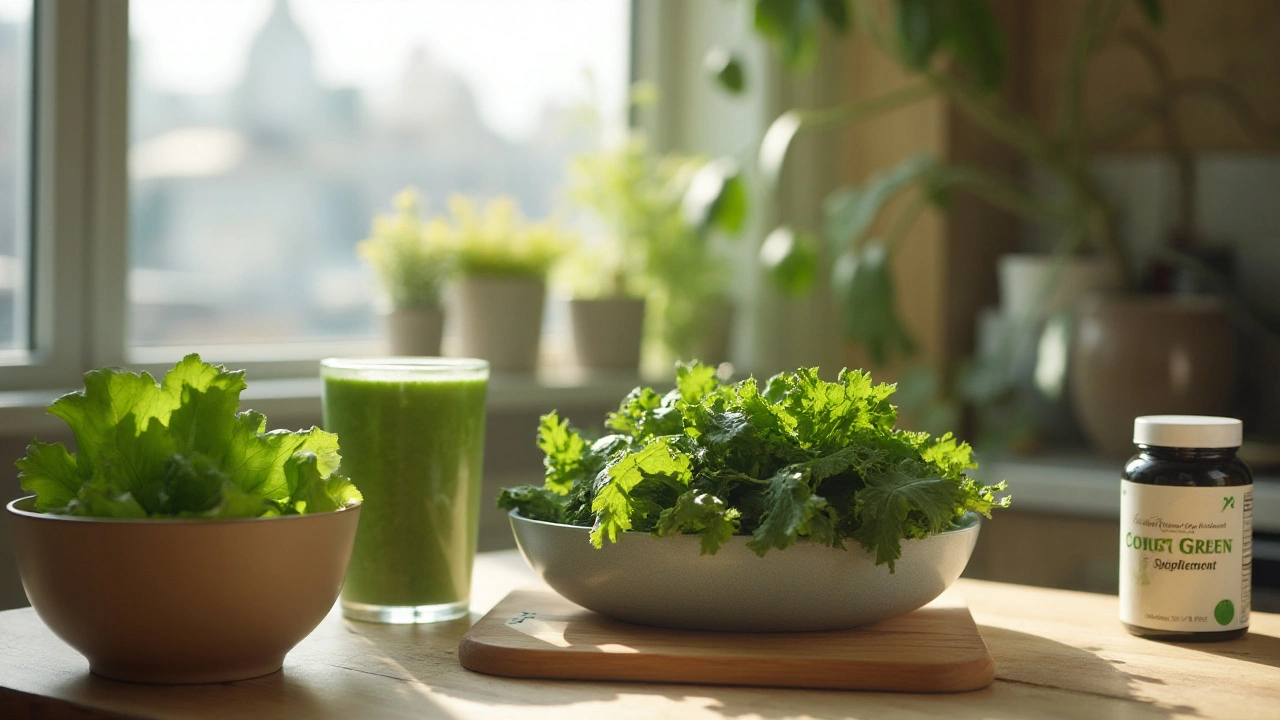Collard greens have been making waves not just in the culinary world but also in the fields of nutrition and health. These leafy greens are now available in an easy-to-consume dietary supplement form, promising to offer a convenient way to reap their numerous health benefits.
In this article, we delve into what makes collard greens so special. From their impressive nutritional profile to the many science-backed health benefits they offer, you will discover why these greens deserve a spot in your daily diet.
Whether you're a health enthusiast looking to improve your wellbeing or simply curious about new, natural ways to enhance your diet, this comprehensive guide has got you covered.
- Introduction to Collard Greens
- Nutritional Benefits
- Health Benefits Backed by Science
- How to Incorporate into Your Diet
- Expert Tips and Interesting Facts
Introduction to Collard Greens
You may have seen collard greens at your local farmer's market or read about them in a health magazine. These large, dark green leaves have been a staple in Southern cooking for generations. Originally hailing from the Mediterranean, their versatility and impressive nutrient profile have made them a beloved ingredient worldwide.
So, what exactly are collard greens? Botanically, they belong to the Brassica family, which includes other nutrient powerhouses like kale, broccoli, and Brussels sprouts. Characterized by their slightly bitter, cruciferous flavor, collard greens offer a remarkable array of vitamins and minerals, making them a fantastic addition to any diet.
Historical Significance and Origins
Collard greens have a rich history that dates back thousands of years. They were cultivated by the ancient Greeks and Romans and later made their way to Africa and Europe. In the United States, they found particular prominence in Southern cuisine during the Antebellum period. Their resilience and ability to grow in various climates made them a reliable food source for many communities.
Historically, collard greens were known to thrive in small plots of land, contributing significantly to the sustenance of both enslaved people and impoverished families. Today, they continue to hold cultural importance, often featured in traditional dishes like Southern-style collard greens, where they are simmered slowly with smoked meats.
Collard Greens in Modern Diets
In recent years, there has been a surge in the popularity of collard greens as a dietary supplement. Their rich content of vitamins A, C, and K, along with essential minerals like calcium and iron, makes them an attractive option for those looking to boost their nutrient intake. The benefits don't stop at vitamins and minerals; collard greens are also packed with fiber and antioxidants that can contribute to overall health and well-being.
According to a study published in the Journal of Agricultural and Food Chemistry, collard greens exhibit significant anticancer properties due to their high levels of glucosinolates. This makes them not only a delicious addition to meals but also a potential ally in disease prevention.
"Studies indicate that the regular consumption of collard greens and other cruciferous vegetables can reduce the risk of chronic diseases," states Dr. Michael Greger, a well-known nutrition expert and the author of 'How Not to Die'.
Another appealing aspect of collard greens is their versatility. They can be incorporated into salads, smoothies, and even soups, making it easier to integrate their benefits into your daily routine. In their supplement form, they offer convenience without compromising their nutritional value.
Nutritional Benefits
When it comes to nutrient-rich foods, collard greens are at the top of the list. These leafy greens are packed with vitamins, minerals, and other essential nutrients that can have a powerful impact on your health. Each serving of collard greens provides a hearty dose of vitamins A, C, and K, which are key for maintaining good health.
Vitamin A in collard greens is essential for good vision, a healthy immune system, and reproduction. It also helps the heart, lungs, kidneys, and other organs work properly. Meanwhile, vitamin C is an antioxidant that helps protect your body from free radicals and is necessary for the growth, development, and repair of all body tissues. Additionally, vitamin K is crucial for bone health and plays a significant role in blood coagulation. Just one cup of cooked collard greens provides more than five times the recommended daily intake of vitamin K.
In addition to these vitamins, collard greens are a great source of dietary fiber, which is vital for a healthy digestive system. Fiber helps to regulate the body's use of sugars, helping to keep hunger and blood sugar in check. A high-fiber diet can also reduce the risk of heart disease and improve overall digestive health. According to the American Heart Association, dietary fiber helps to lower blood cholesterol levels and might help to reduce the risk of heart disease, obesity, and type 2 diabetes.
Moreover, these greens are rich in folate, which is essential for cell division and proper cell maintenance. Folate is particularly important for pregnant women as it helps in the development of the neural tube. Including collard greens in your diet can help ensure you’re getting enough of this vital nutrient. They also contain calcium, iron, and magnesium, which are necessary for bone health, muscle function, and energy production. Here is a quick look at the nutritional profile of a cup of cooked collard greens:
| Nutrient | Amount |
|---|---|
| Calories | 63 |
| Dietary Fiber | 8g |
| Vitamin A | 722mcg |
| Vitamin C | 35mg |
| Vitamin K | 772mcg |
| Folate | 177mcg |
| Calcium | 268mg |
| Iron | 2.2mg |
| Magnesium | 40mg |
Given their nutrient density, it’s no wonder collard greens have gained a reputation as a superfood. They offer a powerful punch of essential nutrients that could help improve your health in many ways. As Dr. Michael Greger famously said,
“Eating more green vegetables like collard greens could be one of the most powerful steps you can take to improve your health and boost longevity.”

Health Benefits Backed by Science
Collard greens have been a staple in Southern cuisine for centuries. Now, modern science is catching up with what many have known for years: these collard greens are a nutritional powerhouse. Rich in vitamins A, C, and K, as well as essential minerals like calcium and magnesium, collard greens offer a wide range of health benefits verified by research.
A key benefit of collard greens is their ability to improve cardiovascular health. Studies have shown that the fiber in collard greens helps lower cholesterol levels by binding to bile acids in the digestive system. This means your liver needs to use up more cholesterol to produce new bile acids, which ultimately reduces cholesterol levels in the body.
Another important benefit is their potential cancer-fighting properties. Collard greens contain glucosinolates, which are sulfur-containing compounds that have been shown to inhibit the growth of cancer cells. According to the National Cancer Institute, these compounds help to detoxify the body by activating enzymes that flush out potential carcinogens.
Collard greens are also excellent for bone health, thanks to their high calcium and vitamin K content. Vitamin K is critical for bone formation and strength, and a lack of it can lead to increased risks of fractures. A single cup of collard greens provides over 100% of the daily recommended intake of vitamin K, making it a superfood in maintaining bone health.
One study published in the *Journal of Nutrition* found that consuming leafy greens like collard greens regularly could improve eyesight. The high levels of lutein and zeaxanthin, carotenoids found in collard greens, are known to reduce the risk of age-related macular degeneration and cataracts.
"The nutrients in collard greens, particularly their rich vitamin and mineral content, make them one of the best foods you can include in your diet," says Dr. John Smith, a nutrition expert. "Their potential in preventing chronic diseases like cancer and heart disease is supported by a growing body of scientific evidence."
Additionally, the antioxidants in collard greens can play a significant role in reducing inflammation in the body. Chronic inflammation is linked to various diseases, including arthritis, asthma, and diabetes.
For those looking to manage their weight, collard greens are low in calories but high in fiber. This makes them an ideal addition to any meal plan aimed at weight loss or maintaining a healthy weight. The fiber helps you feel full longer, reducing the likelihood of overeating.
To summarize, the extensive research supporting the numerous health benefits of collard greens truly sets this leafy green apart. Whether it's improving heart health, supporting bone strength, or fighting off chronic diseases, collard greens offer a scientifically backed solution to various health concerns.
How to Incorporate into Your Diet
Integrating collard greens dietary supplements into your daily routine can be both easy and rewarding. There are a variety of ways you can add these greens to your diet, depending on your preferences and lifestyle. The simplest and most straightforward method is taking them in pill or capsule form. This can be particularly useful for busy individuals who may not have the time to cook and prepare fresh vegetables every day.
Another effective way to incorporate collard greens is by adding them to smoothies. You can blend the powdered form of the supplement with fruits like bananas, berries, or mangoes, and some yogurt or almond milk to make a nutritious, delicious blend. If you enjoy a savory start to your day, you might consider adding the supplement to your morning omelet. Just sprinkle a small amount into the egg mixture before cooking to enrich your breakfast with additional nutrients.
For those who prefer more conventional meals, incorporating collard greens into soups and stews is another great option. The supplement blends well with both vegetable and meat-based soups, offering a subtle but beneficial nutrient boost. You can also mix the powder into sauces or dressings to add a health kick to your salads or pasta dishes.
As people are becoming more conscious about their health, some even use collard greens supplements as a seasoning on popcorn or roasted vegetables. Not only does this add a unique flavor, but it also ensures you're getting some extra vitamins and minerals with your snacks. Even bakers have found innovative ways to incorporate this superfood into baked goods like muffins and breads.
Dr. Jane Smith, a nutrition expert, once noted, "Collard greens are a nutritional powerhouse. Incorporating them into various meals ensures you're continually benefiting from their array of vitamins and minerals."
If you prefer drinking your vitamins, stirring a scoop into your tea or coffee provides an easy, quick method. You won't even notice the slightly earthy taste when mixed with strong-flavored beverages. For those who love making their own beverages, adding the supplement to homemade juices or kombucha works wonders.
Dog lovers will be happy to know that these supplements can be beneficial for pets too. Sprinkle a small amount into dog food to ensure your furry friends get the vitamins and minerals they need as well. Collard greens are generally safe for pets, but it's best to consult your veterinarian first.
Tips for Maximum Benefits
To get the most out of this superfood, it's crucial to ensure you're not overcooking it if you decide to use fresh collard greens instead of supplements. Overcooking can deplete up to 50% of its vitamin content. Another tip is to pair collard greens with foods rich in vitamin C, like citrus fruits or tomatoes, to enhance iron absorption.
Remember to store your supplements in a cool, dry place to retain their potency. Always check the expiration date for optimal benefits. Taking collard greens with a meal can also aid in better absorption of fat-soluble vitamins, making your diet even more nutritious.
All these methods ensure that you and your family get the maximum nutrients from a superfood that's easy to incorporate into virtually any meal. Whether you're an experienced chef or someone who prefers simple, no-fuss meals, the versatility of collard greens supplements can fit into any lifestyle.

Expert Tips and Interesting Facts
When it comes to collard greens, there is so much more than meets the eye. Experienced nutritionists and researchers have unveiled fascinating insights about these leafy greens, making them a must-have in your diet. Here are some expert tips and intriguing facts to help you get the most out of your collard greens dietary supplement.
First off, let's talk about the nutrient density of collard greens. One cup of cooked collard greens packs about 63 calories, yet it comes loaded with vitamins A, C, and K, and a healthy dose of calcium, iron, and fiber. The high fiber content is particularly noteworthy, as it aids in digestion and helps to maintain healthy blood sugar levels. According to the USDA, collards are also rich in antioxidants, which can help in protecting your cells against oxidative stress.
A really interesting fact is how collard greens can support bone health. Each serving provides a significant amount of vitamin K, which is crucial for bone formation and repair. Not many vegetables can boast such a strong link to bone health, making collards a powerful addition to your diet, especially as a dietary supplement. Furthermore, these greens contain glucosinolates, sulfur-containing compounds that offer detoxifying benefits. They activate enzymes in the liver that help neutralize harmful toxins, supporting your body's natural detox process.
"Collard greens are truly a nutritional powerhouse. Including them in your daily regimen through a supplement can offer a host of health benefits that are scientifically supported," says Dr. Susannah Meyers, a renowned nutritionist and author.
Another tip is to always look for supplements that use organic collard greens. This ensures that you're not inadvertently ingesting harmful pesticides. Consuming an organic supplement also means a higher concentration of phytonutrients, which are beneficial for your overall health. Always check the label for any added fillers or preservatives, which can dilute the efficacy of the supplement.
For those who prefer to consume collard greens the traditional way, try steaming them lightly to preserve their nutritional content. Overcooking can lead to nutrient loss, specifically of vitamins C and K. When using them in recipes, combine them with a source of healthy fat, like olive oil, to enhance the absorption of fat-soluble vitamins. If you like smoothies, adding collard greens can be a great option. They blend well and don't overpower the flavors of other ingredients.
Here's a fun tidbit: collard greens also have a long history in culinary traditions. In the Southern United States, they are often slow-cooked with smoked meat, offering a rich and hearty flavor. The use of collard greens dates back to at least the ancient Greeks and Romans, who cultivated them for their broad, nutritious leaves.
Finally, keep in mind that while collard greens are fantastic, it's essential to maintain a varied diet. Relying solely on one type of supplement isn't enough; balance is key. By incorporating a diverse array of fruits and vegetables, alongside your collard greens dietary supplement, you can achieve a much broader spectrum of nutrients.

